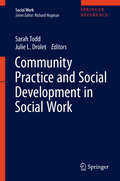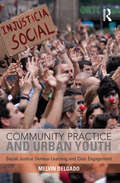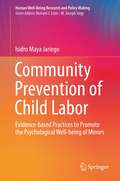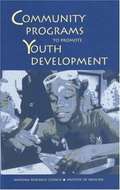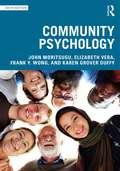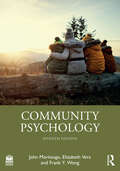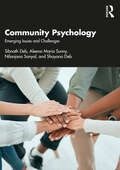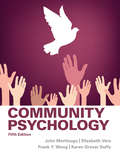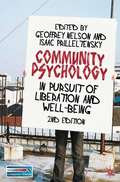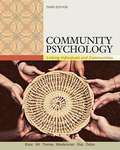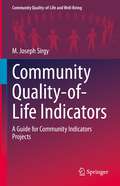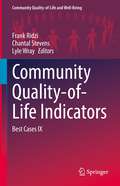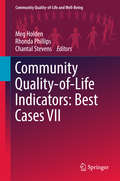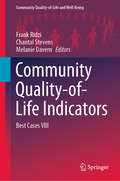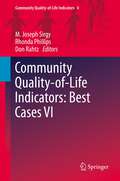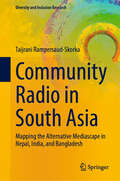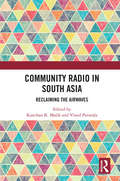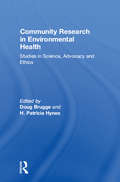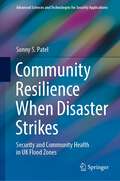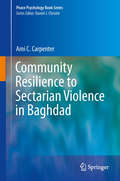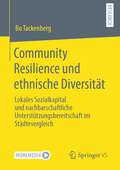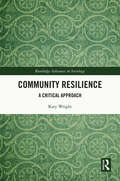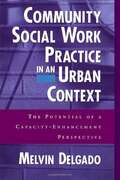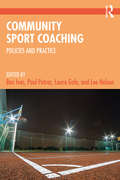- Table View
- List View
Community Practice and Social Development in Social Work (Social Work)
by Julie L. Drolet Sarah ToddThis book brings together leaders in the field of community practice and social development in social work. The chapters discuss the implications of social development in social work practice, policy, and service structures.
Community Practice and Urban Youth: Social Justice Service-Learning and Civic Engagement (Social Justice Youth Community Practice Ser.)
by Melvin DelgadoCommunity Practice and Urban Youth is for graduate level students in fields that offer youth studies and community practice courses. Practitioners in these fields, too, will find the book particularly useful in furthering the integration of social justice as a conceptual and philosophical foundation. The use of food, environmental justice, and immigrant-rights and the book’s focus on service-learning and civic engagement involving these three topics offers an innovative approach for courses.
Community Prevention of Child Labor: Evidence-based Practices to Promote the Psychological Well-being of Minors (Human Well-Being Research and Policy Making)
by Isidro Maya JariegoThis book discusses preventive actions that have led to reduction in the prevalence of child labor across the world over the 21st century. It identifies exemplary programs in the area of community prevention that have had exceptional results; for example, the involvement of children in hazardous work globally being reduced by half. It documents a wide range of contexts where concerted action has counteracted social permissiveness towards child labor, including psycho-educational interventions in preventing early school leaving and conditional cash benefits which counteract family poverty. The book presents a set of evidence-based practices that are particularly useful for psychologists, educators, and social workers. More broadly, this book is also of interest to policymakers, professionals, and activists involved in child protection policy or in implementing programs to promote the psychological well-being of children.
Community Programs To Promote Youth Development
by Committee on Community-Level Programs for YouthAfter-school programs, scout groups, community service activities, religious youth groups, and other community-based activities have long been thought to play a key role in the lives of adolescents. But what do we know about the role of such programs for today's adolescents? How can we ensure that programs are designed to successfully meet young people's developmental needs and help them become healthy, happy, and productive adults? Community Programs to Promote Youth Development explores these questions, focusing on essential elements of adolescent well-being and healthy development. It offers recommendations for policy, practice, and research to ensure that programs are well designed to meet young people's developmental needs. The book also discusses the features of programs that can contribute to a successful transition from adolescence to adulthood. It examines what we know about the current landscape of youth development programs for America's youth, as well as how these programs are meeting their diverse needs. Recognizing the importance of adolescence as a period of transition to adulthood, Community Programs to Promote Youth Development offers authoritative guidance to policy makers, practitioners, researchers, and other key stakeholders on the role of youth development programs to promote the healthy development and well-being of the nation's youth.
Community Psychology
by Karen Grover Duffy Frank Y Wong Elizabeth Vera John MoritsuguCommunity Psychology, 6th Edition offers an easy-to-navigate, clearly organized, and comprehensive overview of the field, with theoretical roots that carry over to practical applications. Presenting the concepts of community psychology and social change, these concepts are then applied to various systems addressing the human condition: mental health, medical, public health, school, legal, and industrial/organizational. Through a unique three-part approach, including concepts, interventions, and applications of the theory, the book opens the field of community psychology to students who are interested in how psychology might help themselves and the systems around them. It then focuses on the prevention of problems, the promotion of well-being, the empowerment of members within a community, the appreciation of diversity, and an ecological model for the understanding of human behavior. Attention is paid to both "classic" early writings and the most recent journal articles and reviews by today’s practitioners and researchers. Historical and alternative methods of effecting social change are explored in this book, with the overall theme that the environment is as important as the individual in it. This 6th edition will include new topical subjects such as grit and life success, changes in technology and their impact, interventions based on networking, social movements and justice, dealing with stigma, and new models of health. It will appeal to advanced undergraduates as well as graduates taking courses on community psychology, social psychology, clinical psychology, and related fields.
Community Psychology
by Elizabeth Vera John Moritsugu Frank Y. WongCommunity Psychology, 7th Edition presents the field’s conceptual roots and possible applications in a comprehensive overview of the field. Clearly organized and easy to navigate, the text is divided into sections on basic concepts, social change, applications, and the future.The book opens the field of community psychology to students who are interested in how psychology is relevant to their own lives and the systems around them. The applied chapters discuss how community psychology relates to mental health, social and health services, schools and children, law and crime, health and public health, and community/organizational psychology. The new edition updates research and literature and presents developments in theoretical and research methodologies. This edition focuses particularly on description and consideration of critical theory, liberation theology, and decolonization as part of community psychology’s intellectual and value-based evolution. Examples of community psychology in practice are provided throughout the text, and each chapter also features discussion questions for students to consider. A student website and instructor resources provide further ways to engage with the content and support teaching and learning.This highly engaging book explores social change, the mental health of the community, and the importance of the environment upon the individual. It will appeal to advanced undergraduates as well as graduates taking courses on community psychology, social psychology, clinical psychology, and related fields.
Community Psychology: Emerging Issues and Challenges
by Sibnath Deb Aleena Maria Sunny Nilanjana Sanyal Shayana DebThis book focuses on the theoretical concepts of community psychology and its applications in day-to-day life. It discusses the challenges that adversely affect the welfare and well-being of common people and suggests community-centric, evidence-based measures to address them. Factors like new-age lifestyles, fast-paced development, and an increase in occurrence of natural calamities have been detrimental to the psychological well-being of the community. This volume integrates the social, cultural, economic, political, and environmental aspects of community psychology to address community life-based issues which include mental health stigma, social asymmetries, resource disparities, disadvantaged minority groups, the differently abled, HIV/AIDS patients, project-affected people, and disaster victims. Key features of this book include: • Dedicated intervention-based chapters on mental health, physical health, differently abled people, the elderly, vulnerable children, HIV/AIDS patients, and people affected by development projects and disasters. • Focus on challenges faced by students and school-based family counselling. • Case studies and conceptual models for better understanding and application of the subject. The volume will be a valuable resource to students, researchers, and teachers of Psychology, Social Work, Sociology, Public Health, and Social Economics. It will also be an indispensable read for social workers, NGOs, advocacy groups, and policymakers working in the field of social upliftment.
Community Psychology: Fifth Edition (Mysearchlab Series 15% Off Ser.)
by Karen Grover Duffy Frank Y Wong Elizabeth Vera John MoritsuguCommunity Psychology, 5/e focuses on the prevention of problems, the promotion of well-being, empowerment of members within a community, the appreciation of diversity, and an ecological model for the understanding of human behavior. Attention is paid to both "classic" early writings and the most recent journal articles and reviews by today's practitioners and researchers. Historical and alternative methods of effecting social change are explored in this book, with the overall theme that the environment is as important as the individual in it.This text is available in a variety of formats - digital and print. Learning Goals Upon completing this book, readers will be able to: Understand the historical and contemporary principles of community psychology. Apply theory and research to social services, mental health, health, legal, and public health systems
Community Psychology: In Pursuit of Liberation and Well-Being
by Isaac Prilleltensky Geoffrey NelsonFeaturing a wide range of critical perspectives, international examples, exercises and additional online resources, this textbook will encourage students to think more critically about the role of psychology in society and about how community psychology can aid in the liberation of oppressed groups to promote social justice and well-being.
Community Psychology: Linking Individuals and Communities
by Maurice J. Elias Elizabeth Thomas James H. Dalton Abraham Wandersman Jean Hill Bret KloosWith COMMUNITY PSYCHOLOGY, Kloos, Hill, Thomas, Wandersman, and Dalton have addressed the challenge of transforming an abstract, theoretical topic into a lively and understandable subject for students. Through concrete examples and consistent pedagogy, this text helps students understand the concepts as well as how to apply them. After introducing community psychology and its history, the authors describe methods of community research and discuss how to understand communities from the perspectives of sense of community, coping, and social support. The focus then shifts to community programs and actions: preventing problem behavior and promoting social competence, citizen participation, organizing for community and social change, and program evaluation and development.
Community Quality-of-Life Indicators: A Guide for Community Indicators Projects (Community Quality-of-Life and Well-Being)
by M. Joseph SirgyThis training book is designed to help professionals enhance their knowledge of community quality-of-life indicators, and to develop viable community projects. Chapter 1 describes the theoretical concepts that guide the formulation of community indicator projects. Chapter 2 creates a sample community indicator project as a template of the entire process. Chapter 3 describes the planning process: how to identify sponsors, secure funding, develop an organizational structure, select a quality-of-life model, select indicators, and so on. Chapter 4 focuses on data collection. Finally, Chapter 5 describes efforts related to dissemination and promotion of community indicators projects. Written by a stalwart in the field of quality-of-life research, this book provides the tools of sound community project planning for quality-of-life researchers, social workers, social marketers, community research organizations, and policy-makers.
Community Quality-of-Life Indicators: Best Cases IX (Community Quality-of-Life and Well-Being)
by Frank Ridzi Chantal Stevens Lyle WrayThis volume continues the tradition now established since 2006, of compiling excellent research into the practice and application of community indicators in a single source volume. It focuses on the theme of the Community Indicators Consortium 2020 Summit, as a significant venue for the advancement of the practice and theory of community indicators work. It covers the conference's theme of “community resilience”, which is the capacity of all of a community’s elements to survive, adapt, and grow no matter what kinds of chronic stresses and acute shocks they experience. In keeping with the practical, “best cases” emphasis of this book series, the editors incorporate a case-based approach to chapters discussing how specific indicators, indices or series of indicators can lead to better decisions and outcomes to help communities adapt and transform in the face of challenges, helping them prepare for both the expected and the unexpected to sustain and improve quality of life, including technology and open source approaches to data sharing and data-focussed collaboration; evolving approaches that use shared indicators to improve overall community well-being and quality of life; research related to community indicators and policy, application, research, and/or practice; and techniques and approaches to measure resilience. This volume is of interest to social scientists, management professionals, social workers and policy makers working on various aspects of community indicators of quality of life and well-being. Chapter “The Cost of Sea Level Rise for the Island Community of Vinalhaven, Maine: Spurring action through collaborative data analysis” is licensed under the terms of the Creative Commons Attribution 4.0 International License (http://creativecommons.org/licenses/by/4.0/). For further details see licence information in the chapters.
Community Quality-of-Life Indicators: Best Cases VII (Community Quality-of-Life and Well-Being)
by Rhonda Phillips Meg Holden Chantal StevensThis book is the seventh volume in a series covering best practices in community quality of life indicators. The case studies and analysis in this volume demonstrate how community indicators projects today operate within a need to amplify the voice of disadvantaged communities, seriously explore the increasing use of information technology, produce positive community change and sustain these efforts over time. The work presented here spans North American and Australian community work and demonstrates how the field of community indicators has undergone a rapid evolution in only a few decades. Today as in their original formulations, community indicators projects are designed to gauge the social, economic and physical health and well-being of communities.
Community Quality-of-Life Indicators: Best Cases VIII (Community Quality-of-Life and Well-Being)
by Frank Ridzi Chantal Stevens Melanie DavernThis book offers critical insights into the thriving international field of community indicators, incorporating the experiences of government leaders, philanthropic professionals, community planners and a wide range of academic disciplines. It illuminates the important role of community indicators in diverse settings and the rationale for the development and implementation of these innovative projects. This book details many of the practical “how to” aspects of the field as well as lessons learned from implementing indicators in practice. The case studies included here also demonstrate how, using a variety of data applications, leaders of today are monitoring and measuring progress and communities are empowered to make sustainable improvements in their wellbeing. With examples related to the environment, economy, planning, community engagement and health, among others, this book epitomizes the constant innovation, collaborative partnerships and the consummate interdisciplinarity of the community indicators field of today.
Community Quality-of-Life Indicators: Best Cases Vi (Community Quality-of-Life Indicators #4)
by M. Joseph Sirgy Rhonda Phillips Don RahtzThe proposed book is a sequel to volume 1-4 of Community Quality-of-Life Indicators: Best Cases. The first volume, Community Quality-of-Life Indicators: Best Cases was edited by M. Joseph Sirgy, Don Rahtz, and Dong-Jin Lee and published in 2004 by Kluwer Academic Publishers in the Social Indicators Research Book Series (volume 22). The second volume, Community Quality-of-Life Indicators: Best Cases II was edited by M. Joseph Sirgy, Don Rahtz, and David Swain and published in published in 2006 by Springer in the Social Indicators Research Book Series (volume 28). The third and fourth volumes, Community Quality-of-Life Indicators: Best Cases III and Community Quality-of-Life Indicators: Best Cases IV, were edited also by M. Joseph Sirgy, Rhonda Phillips, and Don Rahtz and published in 2009 by Springer in the ISQOLS Community Quality-of-Life Indicators Best Cases Book Series (volumes 1 and 2).
Community Radio in South Asia: Mapping the Alternative Mediascape in Nepal, India, and Bangladesh (Diversity and Inclusion Research)
by Taijrani Rampersaud-SkorkaThis monograph, based on the author's successful PhD dissertation, examines the community radio (CR) landscape in Nepal, India, and Bangladesh. It introduces an inclusionary South Asia-specific framework for analyzing CR, grounded in global alternative media theories. Using a mapping methodology, the monograph presents both primary and secondary data. Secondary data, gathered through desk reviews, is organized into a Community Media Database (CMD) for South Asia, while primary data from interviews and case studies is analyzed across four thematic areas: policy environment, ownership, community, and programming. The book offers detailed country profiles, case studies profiles, and a comprehensive analysis of the thematic areas in each country. It concludes with 24 guiding principles aimed at addressing challenges and opportunities for CR in South Asia.
Community Radio in South Asia: Reclaiming the Airwaves
by Vinod Pavarala Kanchan K. MalikThis book explores the state of community radio, a significant independent media movement that began about two decades ago, in different parts of South Asia. The volume outlines the socioeconomic and historical contexts for understanding the evolution and functioning of community radio in an increasingly globalised media environment. It provides a ring-side view of how various countries in South Asia have formulated policies that enabled the emergence of this third sector of broadcasting (public and private being the other two) through radio, rendering the media ecology in the region more pluralistic and diverse. The chapters in the volume, interspersed by practitioner perspectives, discuss a range of key issues related to community radio: radio policies, NGOisation of community radio, spectrum management and democratisation of technology, disasters/emergencies, gender issues, sustainability, and conflicts. One of the first of its kind, this volume will appeal to scholars and researchers of community media and independent media studies, cultural studies, as well as sociology and social anthropology, and South Asian studies.
Community Research in Environmental Health: Studies in Science, Advocacy and Ethics
by H. Patricia HynesInterest in environmental health research conducted with community participation has increased dramatically in recent years. In this book, Doug Brugge and H. Patricia Hynes relate experience of multiple community collaborations across the United States and highlight the lessons to be learned for those involved in or embarking on community-collaborative research. The volume brings together a variety of cases, examining the nature and form that the collaboration took, the scientific findings from the work and the ethical issues that needed to be addressed. Actual cases covered include lead contaminated soil, asthma and housing conditions, the impact of development on environmental health, the impact of radiation hazards, urban gardening, hog farming and diesel exhaust. The concluding section analyses the experiences of those involved and puts their findings into broader context. Community Research in Environmental Health: Lessons in Science, Advocacy and Ethics provides a valuable guide for all those interested and involved in community research.
Community Resilience When Disaster Strikes: Security and Community Health in UK Flood Zones (Advanced Sciences and Technologies for Security Applications)
by Sonny S. PatelThis book addresses the operationalization of community resilience in the United Kingdom (UK) in connection with severe floods. Written for early academic professionals, students, and community practitioners, it investigates the educational and practical meaning and application of community resilience using a UK-centric local-level case study. Exploring the perceptions of both those who have been affected by a natural hazard and those who have not, the book reveals how trust, community resources, and neighborhood security can offer effective ways of bringing communities together after a natural hazard. The author introduces the topic of community resilience as it applies to disasters in Chapter 1 and its implications for securing and improving the wellbeing of disaster-affected communities in Chapters 2 and 3. In Chapter 4, the lessons learned contributing to the available information and research on community resilience are reviewed. Finally, the author offers recommendations and outlines future directions in coping with the uncertainty and insecurity caused by natural hazards in Chapter 5.
Community Resilience in Natural Disasters
by Diane Bretherton Anouk RideTold through the voices of local community leaders, this book analyzes how communities respond to natural disasters and how outsiders contribute positively - or negatively - to their response, promoting debate on the role of aid and the media in times of crisis.
Community Resilience to Sectarian Violence in Baghdad (Peace Psychology Book Series)
by Ami C. CarpenterThe recent conflict in Iraq evolved from an insurgency against the interim U. S. led government (the Coalition Provisional Authority or CPA) into a sectarian civil war. Violence became widespread, especially in areas of Baghdad City such as Sadr City, Al Amiriyah, and Al Adhamiya. However, a number of multiethnic neighborhoods in Baghdad successfully prevented sectarian attitudes and behaviors from taking hold. Four communities stand out in their self-organization to prevent the escalation of violence. This book looks at what makes these communities different from other areas within Baghdad. In-depth interviews in Sunni-dominant, Shia-dominant and Mixed neighborhoods generated a few key insights about conflict-resilience, or the capacity to prevent structural changes associated with conflict escalation. Key factors turned out to be the organization of non-sectarian self-defense groups, place attachment, collective efficacy, active intervention to de-escalate tensions, and also the presence of local religious leaders who forbid sectarian attacks. The continuity or strength of interpersonal relationships supported by the integrated physical structure of these neighborhoods and internal versus tribal conflict resolution mechanisms played a role as well. This volume examines the characteristics of the communities that have successfully prevented the rise of violence, and how they are able to maintain qualities of resilience to violent conflict.
Community Resilience und ethnische Diversität: Lokales Sozialkapital und nachbarschaftliche Unterstützungsbereitschaft im Städtevergleich
by Bo TackenbergAus einer soziologischen Perspektive widmet sich die Arbeit dem Konzept der Community Resilience, mit dem wesentliche Anpassungs- und Bewältigungsressourcen gesellschaftlicher Herausforderungen - wie Krisen, Katastrophen und sozialen Umbruchsphasen - in sozialen Prozessen und der kollektiven Leistungsfähigkeit der Bevölkerung verortet werden. Mittels Mehrebenenmodellierung wird untersucht, inwieweit ethnische Diversität und soziale Benachteiligung im Stadtteil Einfluss auf die Wahrnehmung lokalen Sozialkapitals und kollektiver Wirksamkeit sowie der nachbarschaftlichen Unterstützungsbereitschaft nehmen. Zudem wird untersucht, in welchem Verhältnis lokales Sozialkapital, kollektive Wirksamkeit und nachbarschaftliche Unterstützungsbereitschaft zueinander stehen.
Community Resilience: A Critical Approach (Routledge Advances in Sociology)
by Katy WrightThis book provides an alternative perspective on community resilience, drawing on critical sociological and social policy insights about how people individually and collectively cope with different kinds of adversity. Based on the idea that resilience is more than simply an invention of neoliberal governments, this book explores diverse expressions of resilience and considers what supports and undermines people’s resilience in different contexts. Focusing on the United Kingdom, it examines the contradictions and limitations of neoliberal resilience policies and the role of policy in shaping how vulnerabilities are distributed and how resilience is manifested.The book explores different types of resilience including planning, response, recovery, adaptation and transformation, which are examined in relation to different types of threat such as financial hardship, disasters and climate change. It argues that resilience cannot act as an antidote to vulnerability, and aims to demonstrate the importance of shared institutions in underpinning resilience and in preventing socially created vulnerabilities. It will be of interest to academics, students and well-informed practitioners working with the concept of resilience within the subject areas of Sociology, Social Policy, Human Geography, Environmental Humanities and International Development.
Community Social Work Practice In An Urban Context: The Potential Of A Capacity-enhancement Perspective
by Melvin DelgadoThe future of social work rests on how well it can address urban issues, particularly the needs of urban communities of color. Yet too many texts either focus exclusively on the problems these communities face or simply ignore their unique characteristics all together. Community Social Work Practice in an Urban Context aims to teach graduate students in social work how to create positive community environments in marginalized urban-based communities. Melvin Delgado's innovative and creative approach to urban social work practice shows students how to focus on the assets urban communities already have. Specifically, he suggests a capacity enhancement modelapproaching the adults and children of these communities through the arts and other positive community projects, such as community gardens, playgrounds, and murals. This model offers tremendous potential for unifying communities that consist of groups from very different cultural backgrounds. Social workers are in unique positions to use this model based upon their familiarity with communities and their exposure to issues related to oppression. This model also provides them with the opportunity to identify, engage, and plan services with communities. In turn, these projects are based upon a community's strengths and represent an effort to develop a community's capacity to help itself with assistance from professionals. Graduate students specializing in urban-focused social work will find this a fresh approach to a timely issue, particularly in community and macro practice courses. It not only shows students new and more positive ways to approach their urban clients, but it also provides them with a better way to address communities as a whole.
Community Sport Coaching: Policies and Practice
by Ben IvesIn many Western nations, community sport coaches occupy a central role in supporting the physical health, mental wellbeing, and wider social development of individuals and communities. However, there is no existing academic textbook that examines the policy contexts in which their work is located or, indeed, the challenges and opportunities that are an inherent feature of their everyday practice. Bringing together an international team of leading researchers in sport policy, sport development, sport pedagogy, and sport coaching, as well as some of the best emerging talents, this book is the first to critically consider a range of policy and practice issues directly connected to community sport coaching. Comprehensive, timely, and cutting-edge, no other text brings together in one place such a depth and breadth of scholarly material addressing this important field of endeavour. This book is an essential resource for educators, students, practitioners, and policy makers concerned with community sport coaching globally.
